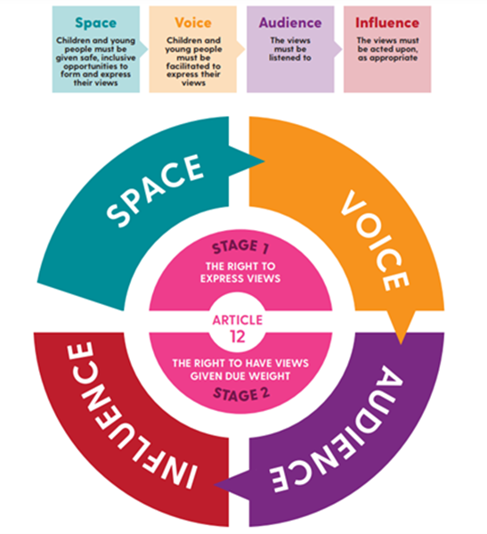‘Lundyfying’ CORC and the Anna Freud Centre: CORC Participation Officer, Hannah Brunskill reflects on recent learnings from Professor Lundy.
Youth participation is a priority within mental health services and increasingly important in conversations when planning anything that effects a young person’s experience. Including young people in decision-making and development within services that involve them, can feel tricky to navigate, rightfully so, there are considerations that must be taken seriously. This is not to say that it can’t be done in an effective engaging way though, with some help and guidance, youth participation can prove to be the most rewarding side to any project.
The CORC team and I recently had the pleasure of attending a talk from Professor Laura Lundy hosted by the Anna Freud Centre, which proved not only inspiring and motivating, but eye-opening when thinking about the theory and law behind participation with young people. Professor Lundy spoke about her background in law, writing the Northern Irish book on education law, and how this was her journey into developing the model based on the human rights of the child. Lundy speaks about Article 12 of the UN Convention on the Rights of the Child, being in two parts, the first is a child’s right to express their view and the second, an obligation to be given due weight.
An interesting note from the session, was when Professor Lundy spoke about the rights covering an individual when a decision is affecting them however, it is also now recognised as a right of groups of children too. This is known as ‘collective participation’ in the child’s rights world. This should be considered when writing new policies, laws or practical guidance that impacts groups of children as well as an individual child. All human rights essentially come from three things, notion of dignity, entitlement to equality and the respect for our worth as a human person. Which can mostly manifest through autonomy as an adult, which children don’t always have. This right is grounded in those concepts, it is an offence to dignity to have a decision made about them, without them. Children and young people that are often dependant on others to make decisions for them, are often those who are in receipt of more state services. It is vital that we put those rights at the forefront of our work, seek their views and give their views the weight it deserves.
Whilst we see the importance of youth participation throughout projects that effect young people and, have strong values when it comes to including young people throughout initiatives at CORC and the centre, we saw a need for officially adopting a centre-wide framework and developing a strategy. Participation models can offer useful frameworks and assistance in getting started with all thing’s participation and offers a way for those who access our services a way to hold us accountable. We chose The Lundy Model as we believe a rights-based model is the way forward in giving the young person’s voice due weight and facilitating meaningful participation from the beginning to end of all projects.
By adopting this model, we hope to build on previous successes and further embed meaningful participation in our work.
Stay tuned for our next steps in ‘Lundyfying’ our centre-wide strategy for youth and parent/carer participation and engagement!

(Professor Laura Lundy & Children, Equality, Disability, Integration and Youth gov.ie, 2020)
References:
Professor Laura Lundy & Children, Equality, Disability, Integration and Youth gov.ie. (2020). Participation Framework. In Hub Na Nog. Government of Ireland.
Access the Child Participation Framework PDF
Interested in learning more? In January, Hannah will be leading a webinar – more details below
Webinar: Engaging young people in routine outcome monitoring